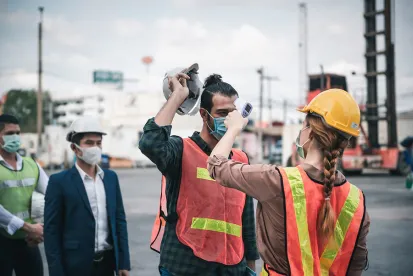During the past 14 months of the COVID-19 pandemic, we have experienced an unprecedented flurry of new laws, regulations and guidance, frequently conflicting with one another and unclear. Although health concerns arising from the pandemic are finally starting to subside with the growing distribution of vaccinations, employers will still face challenges and uncertainty as the applicable laws and guidance are peeled back in the “new normal.”
Many questions still exist as to mandatory vaccines, medical confidentiality, incentives for employees to receive the vaccines, protocols for vaccinated employees to interact in the workplace and safety protocols in general. While New Jersey and New York adopted a somewhat coordinated approach to closing measures during the pandemic, and recently announced joint relaxation of capacity requirements, key differences in approaches remain. Set forth below is a summary of recent developments and recommended next steps.
Federal
As we have reported previously, the Equal Employment Opportunity Commission (EEOC) has taken the position that employers may require employees to be vaccinated in order to return to the worksite, subject to sincerely held religious beliefs and medical issues, which may require reasonable accommodations. However, this does not automatically mean that employees who decline to be vaccinated may automatically be terminated. The EEOC expressly stated that an employer must not terminate an employee without further consideration of the applicable legal issues, including other possible accommodations (such as remote work). Another important point is that in a union setting, mandatory COVID-19 vaccines would likely be a mandatory subject of negotiations. In addition, the EEOC has announced that it is preparing guidance as to whether employers can provide incentives to employees who receive the vaccine.
The Centers for Disease Control and Prevention (CDC) has issued and continues to issue periodic guidance on considerations for returning to work and vaccine programs, and continues to urge individuals to follow safety protocols.
With many employers facing OSHA claims relating to COVID-19, OSHA, in March 2021, announced a new National Emphasis Program (NEP) pursuant to which OSHA will focus enforcement efforts on those employers that put the largest number of workers at serious risk for contracting COVID-19, as well as on those employers that retaliate against workers for complaints about unsafe or unhealthy conditions. OSHA’s Compliance Safety and Health Officers (CSHOs) will minimize in-person meetings with employers and encourage employers to provide data and documents electronically.
New York
Recent developments in New York State include the New York Health and Essential Rights Act (HERO Act), which directs the New York State Departments of Labor and Health to create enforceable health and safety model plans to prevent airborne infectious diseases in the workplace. The law requires employers to either adopt the model safety plan applicable to their industry or create their own plan meeting or exceeding the minimum standards. If the employer chooses to adopt its own plan, it must do so in consultation with the collective bargaining representatives or with employee participation in a non-unionized workforce. The Prevention Plan must be posted and included in any employee handbook. The law also prohibits discrimination and retaliation against employees who:
-
Report violations of the HERO Act or an employer’s Prevention Plan to any state, local, or federal government entity, public officer or elected official;
-
Report an infectious disease concern; and/or
-
Refuse to work if the employee reasonably believes, in good faith, that such work exposes the employee or other employees or the public to an unreasonable risk of exposure to an airborne infectious disease, provided that the employee notified the employer of their concerns regarding the employer’s failure to comply with the HERO Act and the employer failed to cure or otherwise address those concerns.
Penalties for violations of the HERO Act can be significant – (1) $50 per day for failure to adopt a Prevention Plan; (2) $1,000 to $10,000 for failure to abide by the Prevention Plan; (3) $200/day or $1,000 - $20,000 for repeat offenders.
In addition, New York has mandated paid leave for vaccines at an employee’s regular rate for up to 4 hours per vaccine injection, which must not be charged to existing paid time off accounts. To date, New York has not issued guidance on whether an employer can require its employees to receive the COVID-19 vaccine in order to return to the worksite.
On May 3, 2021, New York, joining with New Jersey and Connecticut, announced relaxation of several restrictions, including the percentage capacity limitations applicable to businesses. Effective May 19, 2021, businesses will only be limited by the space available to maintain 6 feet of social distancing among individuals. However, other than the capacity requirements, the industry specific guidance on the New York Forward website has not yet been modified and will likely continue in effect for some time, including such requirements as wearing masks and conducting daily screening assessments.
New Jersey
On its COVID-19 website, New Jersey has published guidance permitting employers to require that an employee receive the COVID-19 vaccine in order to return to the workplace, unless the employee cannot obtain the vaccine because of a disability, advice from their doctor not to get the vaccine while pregnant or breastfeeding, or a sincerely held religious belief, practice, or observance. As noted above, employers that have unionized staff need to evaluate whether they are required to bargain with the union prior to implementing such a requirement.
Governor Murphy recently issued Executive Order 238 easing certain capacity restrictions for both indoor and outdoor businesses; however, unless expressly rescinded or modified, prior executive orders appear to remain in effect.
Takeaways
The COVID landscape is continuing to evolve and employers must reevaluate their practices in light of new developments in their jurisdictions. While certain capacity restrictions have been lifted, social distancing requirements are still in place, as are the other safety protocols, including requirements to wear masks and conduct daily screenings. The May 3rd Tri-State announcement was a step in the right direction; however, as with everything else involving the pandemic, there are more questions left unanswered than answered. Employers will need to understand that their employees will have varying levels of comfort with the new normal and that returning to on-site work will continue to present challenges. Employers that opt to require vaccines should fully consider the legal and practical implications of such a policy. As always, it is important to communicate with employees and convey that safety continues to be the employer’s priority




 />i
/>i

